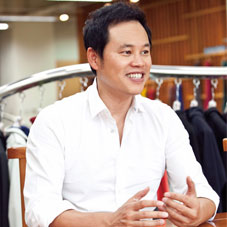
James Huang
President (Global Sales and Operation)
Leaders in the textile industry are navigating an increasingly complex landscape, where sustainability and innovation are no longer just buzzwords but essential components of business strategy. These forward-thinking executives are redefining success by prioritizing eco-friendly practices, such as incorporating renewable materials and reducing waste, while simultaneously driving technological advancements in manufacturing processes.
James Huang, President of Kingwhale Corporation in Taiwan, has developed a thriving business in performance textile manufacturing. James has guided the company to produce high-performing yet ecologically conscious products by introducing new raw materials and sustainable processes. His dedication to sustainability enabled the company to become one of the first businesses in Asia Pacific to receive the esteemed Bluesign certification, which honors environmentally friendly corporate practices. His determination to incorporate sustainability into every aspect of the company's operations has established Kingwhale Corporation as a leader in the field and improved product performance in addition to conscientious environmental policies.
Embarking in an engaging interaction with CEO Insights Asia magazine, James shares his strategies, future roadmap, and much more. Let’s delve into it.
What are the recent strategies you have implemented to streamline and enhance operations across all verticals, ensuring a cohesive and integrated service offering for your clients?
The market has seen a huge drift in the way enterprises functioned and developed post- COVID-19. In response, our strategy focus has been on integrating and combining resources across industries to boost efficiency. We are investigating acquisitions as well as joint ventures that run both vertically and laterally, from upstream to downstream. This entails combining important parties, suppliers, or rivals, to produce a more cohesive and efficient system.
Our goal in combining these resources is to offer our partner brands a smooth and all-inclusive experience that can cut down on redundancy, and provide higher value.
The manufacture of textiles with as little negative influence on the environment as possible is our aim
How do you inspire your team to actively propose and develop environmentally responsible projects?
Our first step towards sustainability is a company-wide goal-setting process that ensures that everyone realizes the significance of sustainability. We believe that sustainability is not just an idea, but a way of life. Every part of our organization is linked with sustainable principles such as minimizing environmental damage, minimizing carbon footprints, and upholding social responsibility from product development to daily operations. We promote engagement by taking part in programs such as RE100 and tackling concerns linked to carbon footprint. In fact, we are the first Asia pacific textile company committed to RE 100.
The team is also motivated to suggest ecologically conscious projects that are in line with our mission to provide high-quality products with the least possible negative impact on the environment. O ne example is the creation of our proprietary yarn L.I.T.
Under your leadership, what key strategies do you employ to ensure efficient resource utilization and a greater reliance on clean energy?
We put a higher priority on resource optimization throughout all operations to make sure that resources such as electricity and water are used as efficiently as possible. Maintaining our equipment on a regular basis is essential to this because it can help streamline production and make it more energy-efficient.
Given our dedication to providing premium performance fabrics, we strongly encourage cross-divisional teams to have conversations regarding ways to increase production efficiency without sacrificing quality.
We are always looking for methods to improve manufacturing line efficiency when it comes to energy. For instance, we conduct experiments to determine ways to increase output and reduce manufacturing cycles.
We have also taken initiatives to incorporate clean energy into our operations. For example, in order to maximize our power usage, we have installed power filters and made investments in renewable energy solutions such as solar panels throughout our facilities. We have also recently made investments in energy storage technologies to increase our level of power supply independence. The objective is to increase energy independence so that our business can produce goods of superior quality while becoming more sustainable.
What is your envisioned roadmap for the growth of your organization?
Our plan is focused on three main areas, which are developing advance material , promoting circularity, and investigating diversification. We continue to invest in new raw materials, going from fossil fuel-based to non-fossil fuel based such as bio-based solutions that still give excellent performance while being sustainable. We plan to make significant investments in material science in order to develop goods that satisfy changing consumer needs.
Our vision is centered on circularity and sustainability. We hope to reduce the number of resources we utilize by placing a strong emphasis on product reuse, recycling, and biodegradability. Handling products responsibly at their end of life is crucial, and we are committed to finding sustainable ways to manage this phase effectively.
Another crucial component of our growth plan is diversification into other industries, such as technical and medical textiles, which enables us to enter new markets while upholding our dedication to sustainability and innovation.
From your experience, what advice would you offer to aspiring leaders in this industry to help them succeed?
My advice would be to embrace innovation and invest in the future. Our industry has always been linked to detrimental effects on the environment, but new technologies and methods of operation can alter that perception. You can make a positive change by working on improvements continuously.
James Huang, President (Global Sales and Operation), Kingwhale Corporation
James Huang has a bachelor's degree in accounting from the Wisconsin School of Business. He has over 20 years of experience leading worldwide sales and operations, with a specialty in cutting-edge and environmentally friendly performance textile techniques.
Hobbies: Swimming, Hiking, Volleyball, Reading
Favorite Cuisine: Chinese
Favorite Travel Destination: Japan



.png)